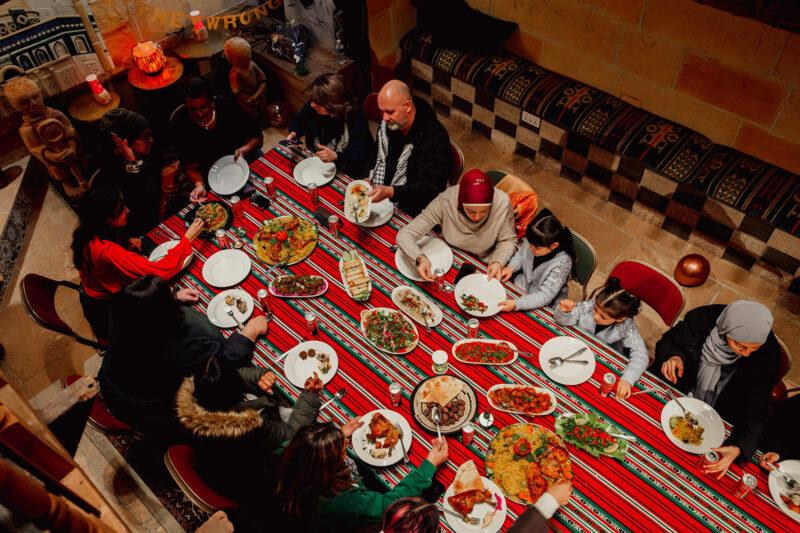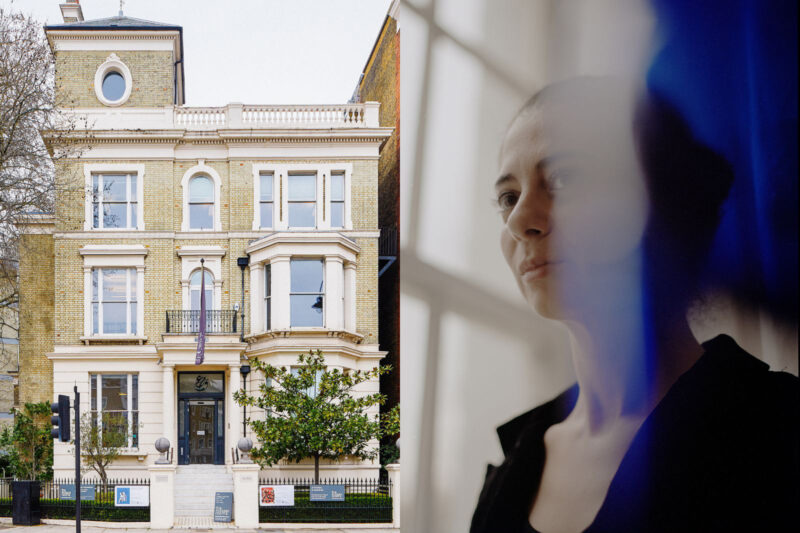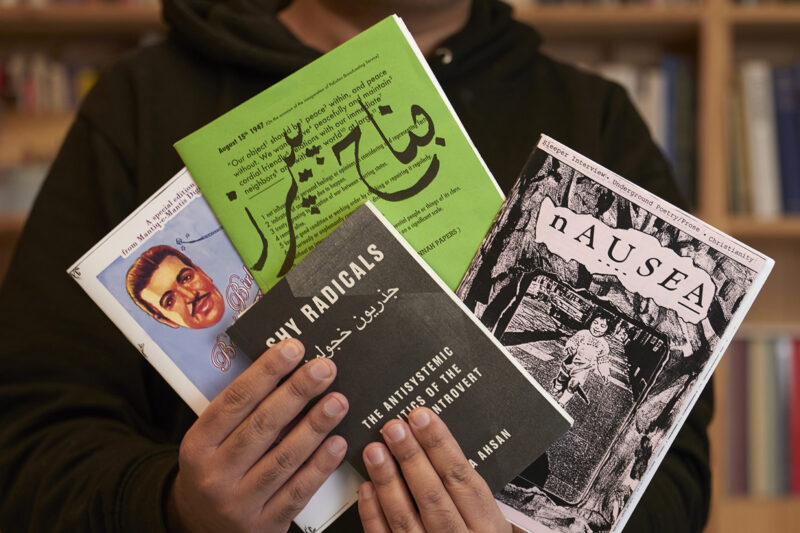
‘My parents have transformed my life’
Rising childcare costs in the UK are a barrier to many women taking on more hours at work. Some Muslims have turned to their relatives for assistance
It’s 5pm and Sehrish Hussein sits around a large mahogany dinner table with her four boys as they discuss the day’s playground politics over a pasta bake. A quick look at the clock and she realises it’s time to kiss her children goodbye as she begins her shift at the local Tesco Metro around the corner from her home in Reading.
On her 10-minute walk to work, Hussein, who has a degree in political science, said: “Honestly, this job is ideal. I usually work within school hours, so the kids don’t even realise I’m away, but sometimes I work the later shift, like today, and it’s only possible because of living as an extended family.”
Hussein married her husband Wajhat — an economics graduate who now works as a black cab driver in London — in 2011. Their boys are 10, eight, six and 18 months old.
“When we graduated in 2008, there was the financial crisis and it was difficult finding work in our fields,” she explained.
She moved into her husband’s five-bedroom family home in Berkshire, where she settled in easily with his now-retired parents and two younger siblings, who are both now in their 20s and working, one as a designer and the other as a solicitor.
The practice of extended families living together is common in most other parts of the world, as it once was in the UK. Just 100 years ago, the majority of Britons lived as multi-generational units, but the industrialisation of employment meant that by the 1950s more people could afford their own space.
However, higher housing costs and lower wages have contributed to around a third of UK households having returned to this mode of living by 2020.
A more recent shift saw around 35% of adult children moving back into their parental homes during the pandemic. The reasons included cutting costs and the fact that many families wanted to create their own support bubbles.
“For us, it’s worked out well — we all get on,” explained Hussein. “The family dynamics mean we get to care for and support each other practically, like with childcare and preparing meals, but also financially, like paying the bills, and emotionally. If anyone wants to talk about whatever they are dealing with, there’s someone there, but we also have the time and space to pursue our own interests and careers.
“If Wajhat and I lived by ourselves I’d have to consider other childcare options, or leave the workforce to be a stay-at-home mum. It’s hard for us to afford a babysitter and we can’t trust just anyone. There’s no one better than grandparents to offer that level of care.”
Last year, the Organisation for Economic Cooperation and Development (OECD) reported that the UK has some of the highest childcare fees in the world, with only Slovakia and Switzerland more expensive.
The average cost of a child under two attending nursery full-time comes to £13,676 a year — just under half the average wage a woman working full-time gets in the UK before tax.
Rising childcare costs have left as many as 1.7 million women in the UK unable to take on more hours at work. A report published last year by the Centre for Progressive Policy states that if women had access to adequate childcare services, they would be able to generate an extra £28.3 billion to the UK economy.
However, women living in multi-generational households, as many UK Muslims do, have been able to turn to relatives for assistance, allowing them to find a balance between raising their families and earning a living.
Hussein refers to her in-laws as a “saving grace”, especially at a time of increasing economic hardship for millions across the UK.
“The cost of living crisis is now affecting the whole country,” she said. “I know some mums have to make the tough decision between going to work and childcare, as the cost of that too has rapidly increased.”
‘The government has to make access to childcare universal, like primary school’
Dr Iram Siraj, a professor of child development and education at Oxford University, explained that for some parents, the cost of childcare can make working counterproductive.
Costs are high, especially in the early years when children require more attention, Siraj explained. However, other countries have found ways to fund their care, like Sweden, where parents pay fees dependent on their income, and Luxembourg, where free childcare is provided for under-fours.
“The government has to make access to childcare universal, like primary school. This can be funded by women paying extra taxes while working,” she said.
Miriam Younis, is a London-based TV executive on maternity leave with her first child.
Younis, who lives in Muswell Hill, has researched the cost of childcare in her neighbourhood and found that the averages stand at £120 a day for an at-home nanny, £95 for a day for a nursery place and £70 for a childminder.
“With those prices, I’ve had to think, ‘Would it even be worth going back to work?’” she said.
After living and working abroad for two decades, Younis returned to London in 2016, met her future husband Stuart and was on the lookout for a place to call home. Having grown up as one of five children in a close-knit family, living close to her parents and siblings was important to her, so when the flat above her parents’ place became available, she jumped at it.
“I come from a big Iraqi-Anglo-Irish family. My dad’s family are from Mosul, but he was born and raised in Baghdad, and that’s where we were born,” she said. “Dad took mum back there after he met her in Liverpool, where she’d grown up. They come from two different cultures and faiths, but they have the same background of hardworking grafters and family values.”
After having her first child in March this year, she says living upstairs from her parents has strengthened her own family and offered a valuable level of mutual support.
“We moved in during the pandemic and my parents were shielding. Stuart and I were able to do the grocery shop for them and have socially distanced cups of tea outside their front door. It’s what so many of us needed,” said Younis.
“But now I’ve had my baby girl, my parents have literally transformed my life. I know I can go back to work if I want, as mum will be on hand to help. I’m thinking of doing a combination of half-days at nursery and mum doing the pick-up until I get home.”
School pick-ups and occasional afternoons with grandparents may be all the help some parents need, but Siraj warns parents against forgoing the nursery experience altogether, if they can afford it.
“When families dip in and out to help with childcare, that may work as an occasional solution in helping mothers to work, but having grandparents care for young ones at the expense of sending them to nursery does not make up for proper expert childcare. Children get a lot of benefit out of pre-schools,” she said.
“A child’s cognition in language and maths and social and motor skills is hugely important, as is socialisation with other children. It’s crucial, especially in a child’s first five years, when the brain is developing at an astonishing rate.”
All the mothers interviewed for this piece are university educated and use their extended families for some level of support. However, they are not representative of all Muslims, or indeed people of other faiths Britain.
“The Muslim community in the UK is relatively poorer than others. Poverty is a real issue,” said Siraj, adding that those providing unpaid labour to support loved ones back into the workforce should also be financially compensated as carers.
“If childcare is going to be sought through relatives, and is seen as a measure to help cut the cost especially during the current cost of living crisis, then the government should tap into this by offering training to the carers and some form of recognition through payment.”
Younis, however, is just happy to enjoy the support of her family and the knowledge that her child will be cared for by the people closest to her.
“I know I’m very lucky, and so is my daughter,” she said. “She’ll get to be surrounded by the special love and care only grandparents can ever give. There really is no one more trustworthy and loving that I’d ever want to leave her with.”
 Newsletter
Newsletter












